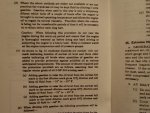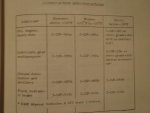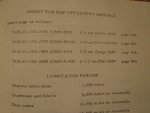Last Fall I took the truck out for an 8 mile ride. It was point A to point B with no stops. The engine seemed to be running OK at driving speed. I got to my destination and as I was pulling into the parking lot naturally I slowed up and I became aware that the engine was running poorly. I happened to look down at the oil pressure gauge and I noticed that there was very little oil pressure. I immediately shut the engine off and let it sit for about an hour.
After that time I then checked the oil dipstick and it appeared to be dry. I borrowed 4 quarts of oil, dumped it in and saw the pressure come right up. With the truck running I looked for leaks, and except for the usual minor ones there was nothing remarkable.
On the way home there was a cloud of white smoke behind me that could have hidden an invading army. I didn't know whether in my haste I might have spilled some oil on the exhaust manifold, or I was actually burning it through the engine. I suspected the latter but I seemed to have decent oil pressure nearly all the way home and I really didn't want to stop to investigate this on the road.
As I was slowing to pull into my driveway that's when I noticed that the pressure had dropped down around almost nothing again. I had no time to deal with it at the time so I parked the the truck for two days. When I next checked the dipstick, to my utter surprise the oil level was two quarts high and it was the viscosity of kerosene.
I haven't investigated this any further yet because it's just been so cold up here, and I find that as I get older I seem to be able to tolerate it less and less. So I have been anxiously waiting for Spring to do this. In the meantime I've since talked to several local guys in the club and I've learned that a ruptured fuel pump diaphragm is a common cause of this problem.
So I would like to explore my options with this. I've seen some very expensive rebuilt pumps out there and I've also seen rebuild kits. Some people are saying not to use the NOS rebuild kits because the crappy modern day gas will ruin them in short order. Then there are people who offer rebuild kits, like Then and now automotive in New York, however some others question their reliability. So I'm really confused as to what to do.
I'm an electronics technician by trade, but I consider myself a pretty good mechanic, and I think that I may be able to do this rebuild job, but I think that I might need a bit of guidance here. I just don't want to buy inappropriate parts or get in over my head. Has anyone done this rebuild, are there reputable reasonably priced suppliers out there, and if so could you please advise me on this? This last question is probably too much to hope for but are there any UTube videos that go into detail on this subject that anyone may know of?
I miss my truck and really want to get it back on the road this Spring. Thanks for reading this and for any help. Lenny
After that time I then checked the oil dipstick and it appeared to be dry. I borrowed 4 quarts of oil, dumped it in and saw the pressure come right up. With the truck running I looked for leaks, and except for the usual minor ones there was nothing remarkable.
On the way home there was a cloud of white smoke behind me that could have hidden an invading army. I didn't know whether in my haste I might have spilled some oil on the exhaust manifold, or I was actually burning it through the engine. I suspected the latter but I seemed to have decent oil pressure nearly all the way home and I really didn't want to stop to investigate this on the road.
As I was slowing to pull into my driveway that's when I noticed that the pressure had dropped down around almost nothing again. I had no time to deal with it at the time so I parked the the truck for two days. When I next checked the dipstick, to my utter surprise the oil level was two quarts high and it was the viscosity of kerosene.
I haven't investigated this any further yet because it's just been so cold up here, and I find that as I get older I seem to be able to tolerate it less and less. So I have been anxiously waiting for Spring to do this. In the meantime I've since talked to several local guys in the club and I've learned that a ruptured fuel pump diaphragm is a common cause of this problem.
So I would like to explore my options with this. I've seen some very expensive rebuilt pumps out there and I've also seen rebuild kits. Some people are saying not to use the NOS rebuild kits because the crappy modern day gas will ruin them in short order. Then there are people who offer rebuild kits, like Then and now automotive in New York, however some others question their reliability. So I'm really confused as to what to do.
I'm an electronics technician by trade, but I consider myself a pretty good mechanic, and I think that I may be able to do this rebuild job, but I think that I might need a bit of guidance here. I just don't want to buy inappropriate parts or get in over my head. Has anyone done this rebuild, are there reputable reasonably priced suppliers out there, and if so could you please advise me on this? This last question is probably too much to hope for but are there any UTube videos that go into detail on this subject that anyone may know of?
I miss my truck and really want to get it back on the road this Spring. Thanks for reading this and for any help. Lenny





